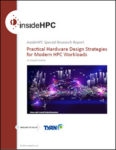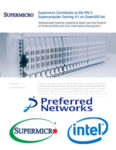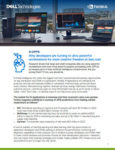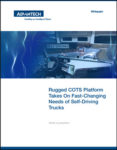This special research report sponsored by Tyan discusses practical hardware design strategies for modern HPC workloads. As hardware continued to develop, technologies like multi-core, GPU, NVMe, and others have allowed new application areas to become possible. These application areas include accelerator assisted HPC, GPU based Deep learning, and Big Data Analytics systems. Unfortunately, implementing a general purpose balanced system solution is not possible for these applications. To achieve the best price-to-performance in each of these application verticals, attention to hardware features and design is most important.
Practical Hardware Design Strategies for Modern HPC Workloads
Many new technologies used in High Performance Computing (HPC) have allowed new application areas to become possible. Advances like multi-core, GPU, NVMe, and others have created application verticals that include accelerator assisted HPC, GPU based Deep Learning, Fast storage and parallel file systems, and Big Data Analytics systems. In this special insideHPC technology guide sponsored by our friends over at Tyan, we look at practical hardware design strategies for modern HPC workloads.
Supermicro and Preferred Networks (PFN) Collaborate to Develop the World’s Most Efficient Supercomputer
Supermicro and Preferred Networks (PFN) collaborated to develop the most efficient supercomputer anywhere on earth, earning the #1 position on the Green500 list. This supercomputer, the MN-3, is comprised of Intel® Xeon® CPUs and MN-Core™ boards developed by Preferred Networks. In this white paper, read more about this collaboration and how a record-setting supercomputer was developed.
Using AI to See What Eye Doctors Can’t
This white paper explains how Voxeleron, a leader in delivering advanced ophthalmic image analysis and machine learning solutions, is extending ophthalmology’s diagnostic horizons with image analysis based on artificial intelligence (AI) models, trained using Dell Precision workstations with NVIDIA GPUs.
Why developers are turning to ultra-powerful workstations for more creative freedom at less cost
This white paper from Dell Technologies discusses why developers are turning to ultra-powerful workstations for more creative freedom at less cost. Research shows that large and small companies alike are using powerful workstations with even more powerful graphic processing units (GPUs) as integral parts of their artificial intelligence infrastructure.
IDC: Led by U.S., Global AI Spending Will More than Double by 2024
Those predicting another “AI winter” will have a quarrel on their hands with industry analyst firm International Data Corp., which forecasts global spending on AI will more than than double over the next four years, from $50.1 billion in 2020 to more than $110 billion in 2024. According to IDC’s Worldwide Artificial Intelligence Spending Guide, AI […]










